Sheenagh Pugh's Blog, page 14
December 11, 2020
Review of Later Emperors by Evan Jones, pub. Carcanet 2020
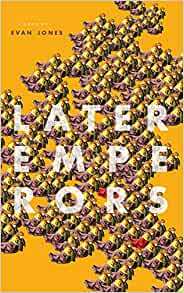
This collection contains three sequences and one long poem, all set in the ancient world. The first sequence, Later Emperors, concerns late and mostly little-known Roman emperors: potted biographies that usually focus on one small, often moving, detail. If that sounds familiar, it should: reading these little poems, as I discovered to my growing delight, one would think Cavafy had come back to life especially to write them. I don’t for a moment think the echoes of his style are any accident. One need only read “Maximus and Balbinus”:
Our lives are like those of Maximus and Balbinus:
the unfortunate soldier and the hapless noble,
two emperors, alone in the palace, a troop
of assassins approaching, while the city
enjoys the Capitoline games.
or “Tacitus”:
Tacitus is too old now. His patience,
his wisdom, could not better
the blood-letting of war. On his death-bed,
the army camped in remote Tyana,
he remembers his garden, his villa,
his morning stroll – life a few months ago –
and in his suffering he curses
the Senate, the godawful Senate.
It is as if Jones had decided there was really only one voice these poems could be written in and had accordingly resurrected it for the purpose.
That suits me, because I can’t get enough of that voice. What I don’t entirely get, however, is the assertion on the back cover and in some reviews that these Later Emperors are conceived as a mirror of the present and “resemble the tyrants of our own time”. I don’t think they do, especially. They range from the inept to the deeply unpleasant, but in what age did rulers not? I would accept that their little biographies show the repetitions of history — as the Earl of Newcastle wrote to his pupil Charles I, “what you read, I would have it history that so you might compare the dead with the living; for the same humours is now as was then, there is no alteration but in names”. But I don’t see anything especially contemporary in them.
The second and third sections deal with the Byzantine chroniclers Michael Psellos and Anna Komnene. Some extensive background reading on both has not quite convinced me I get exactly what these poems are trying to do. In particular I don’t understand the purpose behind the form of the Michael Psellos poems. These are in longish lines, roughly alexandrine, each with a huge break in the middle which you can’t really call a caesura, since they often occur at seemingly random places where no one would naturally pause. It might be trying to reflect the uncertain nature of Michael’s life and career, serving a succession of volatile and unreasonable emperors, but I’m really not sure. The Anna poems are brief journal entries, graceful enough moments but somehow slight and insubstantial for such an intellectual powerhouse of a figure.
The last section; “Coda: Plutarch To His Wife” is a long poem inspired by Plutarch’s “Consolatio Ad Uxorem”, written on hearing, while away on his travels, of his daughter’s death. It is not a translation of that letter; in fact what it reads like is a first draft for it, abandoned when Plutarch realises he is wandering from what he meant to write. This is a promising idea, and movingly executed, as Plutarch continually strays into unrelated details, away from the subject his mind does not want to confront, and just as inevitably returns to it. Its cadences are measured and memorable; its preoccupations, obviously, universal:
I can see not too far off
the outline of our closeness,
and the ways in which that fades,
unfurling us as so gently in the wind one’s
eyes are closed and soon enough
another leaves and what little happiness
there was separates and weighs
on the living rest. Life is made thin
and there is so much in the grave past
and graver future.
What it comes down to is that I like the first and fourth sections of this collection very much, find the third a bit meh and cannot really work out yet what he is getting at in the second. I also have some reservations about his undoubted ability to coin memorable-sounding phrases. Some of these do stand up to examination but some, when you ask yourself what they actually mean, rather fade. I’m not sure this collection, as a whole, quite merits some of the rave reviews it got in the press, but half of it certainly does.
December 1, 2020
Review of “A Quite Impossible Proposal: How Not To Build A Railway” by Andrew Drummond, pub. Origin
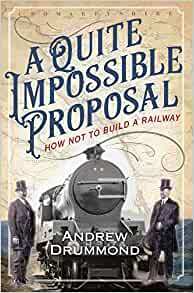
“To make the fisheries work profitably and effectively, better transportation options were needed. And better transportation options meant investing in more and improved railways. As a strategy it made complete sense.
And so we now turn our attention to the complete foul-up, by government and private enterprise alike, of this laudable endeavour.”
It may seem odd to write a history book specifically about things that didn’t happen, in this case railways that were never built in the West Highlands. But then this history is written by Andrew Drummond, eccentric novelist and historian, and it deals with more than railways. It concerns, in fact, the long-term neglect and abuse of a region and its community by a small class of people, namely landowners, who happened to have managed to grab ownership of most of it. It begins with an overview of the dire state of the region in 1883, when the Napier Commission sallied forth to inquire into the condition of crofters and cottars. It was the first time such a commission had really sought the views of ordinary people, and they may have ben surprised by the vehemence of some of the testimony they heard, for instance the Rev Roderick Morison’s fiery denunciation of the way local people were cleared out to make way for deer hunting:
"Glen after glen is being cleared of its shepherd families, who are replaced by one or two solitary game watchers, the idlest of people pretending to earn a living and the best customers of the adjacent public houses and smugglers. […] It will no doubt be said that to interfere with the rights of property is to undermine the very foundations of society. To me it appears that those who endanger those rights are those who make them intolerable by a free and enlightened community. It may I think be boldly said that all rights, customs, monopolies and privileges that tend to the manifest injury of a country and its inhabitants must and ought to – and eventually shall – fall before the increasing intelligence and advancing power of the people."
It was utterances like the Red Reverend’s, and minor insurrections by disaffected crofters protesting about enclosures and evictions, that had alarmed the authorities in Westminster, who feared something on the scale of the troubles in Ireland. Perhaps, though, the Highlanders did not make sufficient nuisances of themselves, because the government, which did spend money on improving infrastructure in Ireland, could never be got to finance public works on the same scale in Scotland. This was one reason the railways that could have made such a difference to the region were never built: two other reasons were the intransigence and parsimony of landowners and the slowness and inefficiency of bureaucracy.
There is much scope here for anger, which often comes through in Drummond’s sardonic tones, for instance when he describes the impact on Scottish fishing of the Northern Barrage, a barrier of mines from Orkney to Norway, placed by the USA and the UK to deter U-boats in the Great War:
"A fair number of civilian lives were lost when ships hit the mines in the years immediately after the war, but by then the American industrialists had made their profits, so no real harm was done."
There is also, however, a lot of scope for his trademark humour and delight in oddities. Sometimes the amusement arises simply from his way of putting things, as when he describes Spencer Perceval as “the only British Prime Minister (so far) to have been assassinated”; sometimes from his unerring eye for absurdities, like the one he spots in the Napier evidence:
“Do they get much employment from shooting tenants?”
“A good deal, for a short time” (Oh, the fatal lack of a hyphen!)
Further entertainment is provided by the cast of real-life characters, particularly the aristos with their impenetrable inter-relationships, like the Earl of Lovelace, who won a medal at the Great Exhibition for polychrome bricks, married Ada Byron the computer programmer and went on to have a daughter who “married the poet and horse-breeder Wilfrid Blunt and thereby inadvertently became the great-aunt of the Soviet spy Anthony Blunt.”
But there is also a huge amount of actual information here, including statistics, maps and plans; serious railway enthusiasts will have a fine time. Drummond is a serious historian; he just isn’t a dull one, perhaps because he never forgets that history is made of human beings, such as the unfortunate passengers trying to travel from Durness to Lairg in 1919, traversing the first twenty miles “in a horse-drawn waggonette surrounded by mail bags, boxes of live lobsters, live calves tied in sacks, personal luggage etc” (an extract from the report of the Rural Transport Committee). How's that for a replacement bus service? Seldom can a trawl through a century’s worth of official papers have produced quite such absorbing results.
November 15, 2020
Review of The Bhutto Dynasty, by Owen Bennett-Jones, pub. Yale University Press
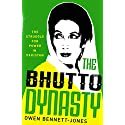
“As a result of dealing with so many suicide attacks, the Pakistani police had noticed that the force of a suicide bomb blast often peeled the bomber’s face clean off the skull and propelled it far from the epicentre. Police could gather these so-called “facemasks” and get a very good idea what the bomber looked like.”
The laconic, matter-of-fact utterance of what might easily have been sensationalised is typical of this biography. It is what it says on the tin, an account of several generations of the powerful Bhutto family and its effects on Pakistan. The three family members who dominate it, obviously, are Benazir, her father Zulfikar Ali, and his father Shahnawaz, but it really is about a family as much as about individual members of it, and as often happens, there are peripheral characters who sound worth a book in themselves.
Though Zulfikar Ali flirted with left-wing politics, he and the rest of his kin were basically hereditary feudal aristocrats from a family which originated in Rajasthan but had removed in the late 17th century to Sindh, where they owned vast tracts of land and did pretty much as they pleased, just like English aristocrats of the time. The first chapter does give some of the historical and social background against which they operated, but personally I would have liked more. The country and the way it worked remained a little shadowy for me; in particular it was never clear to me how the army had come to be so powerful.
Sir Shahnawaz, Zulfikar’s father, was an able time-server whose most interesting act, late in life, was to marry a Hindu girl who was never accepted by his family, a slight which seems to have rankled with her son all his life. But Shahnawaz’s own father, Ghulam Murtaza, was a larger-than-life character who seems to have been deplorable and fascinating in roughly equal measure. His grandson took after him, and here I think is this book’s greatest achievement: it manages to describe a dodgy but undeniably charismatic man dispassionately, factually, not falling for his charm but managing nonetheless to convey what it was that made him so popular with so many. I doubt this is easy. I have read accounts of the Russian revolution that make Lenin sound a complete bore, and whatever else he was, he cannot have been that.
A similar objectivity is maintained with regard to Benazir; inevitably she elicits rather more sympathy from the reader because she seems to have wanted power at least partly for what she could do with it, rather than, like Zulfikar, simply because it was there, but the author remains resolutely neutral, unless one counts a certain dry, occasional innuendo: “For some reason the highly ambitious Beg, despite being with Zia on the day of his death, had not been with him at the precise moment he was assassinated.” This objectivity is the more admirable given the difficulty the author clearly had with sources. He has read many books and government papers and conducted many interviews, but constantly has to remind us that most of the people whose words we are reading had axes to grind and may not be wholly reliable. One source, Sir Shahnawaz’s memoir, was drawn upon by an earlier writer and certainly seems at one time to have existed in the family library, but they now disclaim all knowledge of what may have been the only copy.
This is a properly scholarly book with proper notes, source and index but also manages to be an absorbing and informative read.
November 1, 2020
Review of Sharp Hills by Chrissie Gittins, pub. Indigo Dreams Publishing 2019

Who knew when
two pigeons
flew down the nave
of St Paul’s Cathedral
in Kolkata
while a Bengali Choir
sang Auld Lang Syne
The momentary surprise in the fifth line, resulting from deliberate misdirection, which highlights the juxtaposition of two related but very different cultures, is characteristic of the first part of this collection. It concerns a journey to India, but what lies behind this journey is another, in the steps of a dead father who had been in this region during the war. So we are travelling in time as well as space, never more so than when daughter imagines herself dancing with father in a club that had a different name when he visited it long ago (“Dancing in Silchar”).
This personal angle gives the “Indian” poems an edge, and stops them feeling at all touristy, though they also capture, in “Becoming in Kolkata”, the way a more open and forthcoming culture can change a visitor: “I have become someone […] who smiles at other smiles”. The only poem in this section that didn’t work for me was the ballad “45 Squadron’s Christmas Dinner, Kumbhirgram Air Base, 1943”, and that is because there were too many lines whose rhythms went astray; if there’s one thing a ballad can’t afford, it‘s a faltering metre.
The poems after the “Dancing in Silchar” section are more disparate. There are sharp observational poems, like “Corbel Angel, Southwold Museum” in which the eponymous angel is allowed to voice its memories:
From my load bearing view
I could see snow flickering past windows,
knew that day would follow thick night,
that light would catch the flèche
and glint on unknapped flints.
There are verbal exercises, like “No Salmon Is An Island”, a sort of mash-up of proverbs, quite a few poems inspired by art in one way or another, some more personal and a few of those weird juxtapositions that seem so popular at the moment. Some of them work – I liked “My Niece’s Boyfriend Couldn’t Attend Their Wedding Because He Had a Shift at the Holiday Inn” – but didn’t take to “W. H. Auden Got Married in Tesco (Ledbury)”, in which I felt the humorous treatment was perhaps not so fitting for a really rather noble act.
Chrissie Gittins writes poems for children as well as for adults and there are a few here which, though fine in themselves, I thought might sit better in a collection for children, or at least in a separate section within an adult collection. “The Man Who Moved from Shetland to Glasgow”, with its repeated question “Where is the wind?” and the rhymes suddenly cropping up in “Rain in Nice”; indeed the whole sound of that one:
Then, still.
Until,
a flash of lightning stopped
all ice cream eaters in their tracks,
the deluge was back –
tripping down the tram lines,
trickling down necks,
I suppose there’s no actual reason a collection should not contain poems for children and adults both, but I think one reads them in different ways, hence the thought of a separate section.
Many of the personal poems address loss, and the ways in which someone lost is still present, like “I Carry You With Me”, where an entire trip to Barcelona is viewed through the prism of someone who isn’t actually there and whose absence colours everything seen and experienced. This is a long, cumulative poem that gathers power as it goes on:
I carry you with me to hear a disembodied saxophone playing
up the terraces of Montjuic.
Then I carry you home.
To a Lenten rose, a log fire leaping with flames,
and incessant unconscionable rain.
These poems on loss are the ones which come closest to the spirit of those in the first section, and I think also to their power. The first section, for me, is the strongest and most memorable. The sense of the two simultaneous journeys, in time and space, gives these poems a sort of 3-D feel, a sense of change and of time passing, far removed from everyday “travel” poems.
The temple bells still ring, rowers
reach across the lake, drivers honk their horns
with every breath. Practice gunfire rides
around surrounding valleys.
I hope you rested well at this hill station […]
the monkey is gone from the top of the tree;
the balcony rail, warmed by the sun, warms my hand.
The car horns start an in-depth conversation.
(“Leaving Nainital”)
October 21, 2020
Review of Family Commitments by David Wishart, independently published 2017
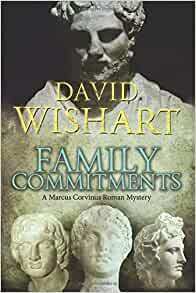
"Gods! Well, you know that’s the way the empire works – selling off unwanted kids to clear a debt is standard practice among the poorer classes throughout the empire, but when it’s your own major-domo that you’ve known for years who’s telling you that, and in Bathyllus’s matter of fact tones, it stops you in your tracks. Sure, I knew that old Grandpa Marcus had bought him fifty-odd years back in Pergamum and taken him to Rome but that was as far as it went.
“What about your mother? I said.
“She was dead, sir. In childbirth, two years previously."
“Ah.” There wasn’t much more I could say, really."
As I’ve mentioned before, I am doing some catch-up reviews for David Wishart’s Corvinus books because I discovered some fans weren’t getting to hear about the latest ones since he left his publisher. In this, one of his best recent ones, Bathyllus, as you can see, takes centre stage when his past catches up with him in the shape of Damon, a long-lost brother. The two have led very different lives and it shows; Damon, though physically very like his brother, has had a harder and more uncertain time and survived it by becoming somewhat of a chancer. He is currently in dire danger because his equally chancy master has been murdered for a valuable item, which his killers did not find on him and which they now assume is in Damon’s hands. Corvinus’s best chance of helping Bathyllus keep him alive is to find the murderers.
We shall meet some old friends in this one, like inveterate gossip Caelius Crispus, Corvinus’s pal Gaius Secundus (complete with a brand-new wife) and cartel boss Eutacticus, if you can call someone a friend who keeps moray eels rather than goldfish and intimates that he might not be averse to feeding you to them. Also some new faces, notably Pomponia Graecina, whom Corvinus approaches for advice when the case starts to turn political, and who gives him a bit of a surprise:
"She was in the garden, standing chatting to a smallish, thin-branched tree with narrow leaves and sprays of pinkish-white flowers.
Right. Chatting. To a tree.
Uh-huh.
She turned towards me […] I noticed she was wearing as many amulets draped around her neck as would equip a stall outside one of the more popular temples."
Pomponia, as it happens, may be a sucker for New Age superstitions but she has a keen mathematical brain. She was a real person, who would later be one of Rome’s first reputed Christians.
As well as being amusing, this one is intermittently rather moving, as our long-term friend Bathyllus’s back-story becomes clearer. The personal and the political also become interestingly mixed up. The case gets satisfyingly murky before Corvinus manages to get to the bottom of things and find some sort of resolution. Oh, and along the way he also has to do a small job for his mother, who fears her ancient husband, Corvinus’s stepfather Priscus, may be having an affair….
October 11, 2020
Review of Larksong Static: Selected Poems 2005-2020 by Martin Malone, pub. Hedgehog Press
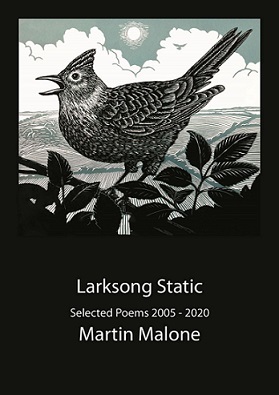
Skimming the poem titles in the early part of this Selected – Barbury Castle, Red Kites at Uffington, Wood on the Downs – you might easily file Malone as a poet of place. And indeed there is a strong element of that in him, as evidenced by the incantatory lists of place-names:
We have been here before. Uffington, Hackpen,
Grim’s Ditch, Ogbourne St.George, Wayland’s Smithy,
Sparshott Firs, Bishopstone and Barbury (“Wood on the Downs”)
In fact, though, it soon becomes clear that the landscape is a backdrop, albeit a sharply and lovingly observed one- in the title (a phrase from the opening poem) “static” is a noun, not an adjective; the lark-song a buzz at the back of the soundtrack. What is really at the heart of these early poems is the development of the relationships played out against the landscape:
You, me and your son
and the best kite on the hill.
Passing around the string, sharing the pull
of possibility, we are shaken;
shuddering through the kite-tail spine
of ourselves, alone in the moment’s blue
latitude. I look from boy to you
with some sense of new gravities.
An inkling load guyed skyward, upon
the caught breath of an idea murmured
into your ear: you, me, us. (“Best Kite On The Hill”)
In the impressive poem “Small Lightnings”, person, time and place coalesce completely:
Driving the A4 to Burghclere, last summer
passes me in an ambulance
on the opposite side. The flashing lights
tell me all I need to know: our time
here is taking its leave on a gurney;
worked at by paramedics whose
urgency is slipping with each
failed shock.
There is then a change of focus, to poems from his Great War pamphlet, "Mr Willett's Summertime" (Poetry Salzburg). I knew these poems already and was pleased to meet some of them again, especially “Let us Sleep Now”, in which Wilfred Owen meets his former enemy on a Vienna tram, heading “up the line to Simmering”, the cemetery at the end of the tracks. The war poems form a bridge between the poems already discussed and a group set in the north: Orkney, Shetland, the north of Scotland. These feel, to me, subtly different from the earlier “landscape” poems in that the landscape genuinely is the protagonist, rather than the backdrop to humans and their activities (I can relate to this, because when I moved to Shetland, I found the natural world seeming far bigger in comparison to humans and playing a larger part in my writing). In “Bright Coast”, though humans are still present, the
drawn line of horizon
stretched across a bay
the gods died making
overshadows them, a player in its own right rather than the backdrop to players. “Static” in the title, as I mentioned, is a noun; the one thing it does not connote here is “stationary”. There are constants in this poetry, like the acute observation of people, eg a mother’s embarrassment in a restaurant:
Sure
before her God, she wavers
before the cutlery. (“Decades”)
and of the natural world:
The hunting pair stirs
a lazy spoon of air (“Red Kites at Uffington”)
or
the twittering mis-
fires of a thousand
tiny engines (“Storm Petrel”)
But there is also clear development, a sense of an authorial viewpoint broadening beyond the personal to the universal. There is also, of course, the odd misfire. I was never sure why “Liverpool-Irish” started rhyming in the middle and then stopped again, but I found it distracting. And I’m not sure the first verse of “Haas Effect” was necessary – I liked the amputee moving into the future “on unsteady leg”, but otherwise the first verse felt like a lecture or instruction leaflet. These, though, are minor quibbles beside the craft that gives us the unsentimental, deeply moving intimacy of “Like I was Your Girlfriend” and “Let us Sleep Now”, and the sure rhythms at the start of “Barbury Castle”:
Meet me at the earthworks
in the small hours on the hill.
Up there, above your childhood,
at the swing-door of first light
October 1, 2020
Review of The Midnight Swan by Catherine Fisher, pub. Firefly Press 2020

Please don’t feel upset. I was so sure the alchemist in Wolverhampton would be the answer to your problem and it was such a shame that he blew himself up just before I got to speak to him. But don’t despair, dear brother! We will get you back to your human shape!
Not surprisingly, the Clockwork Crow is less than reassured by this letter from his brother Enoch. This is the third book in the Clockwork Crow trilogy: as we begin, the enchanted Crow is still trying to regain his human form, the Tylwyth Teg (you can call them fairies if you like, but it doesn’t convey their alien-ness or malevolence) are still trying to get into Plas y Fran, the house they view as theirs, and Seren, the orphan girl taken in by the family who live there, is still wondering exactly what her position in the household is and whether she can feel secure.
The acid-tongued, cantankerous Crow is on excellent form – witness his story about the young woman for whom his fancy, years ago, was the start of his troubles:
“What happened to the young lady?” Tomos asked suddenly, as if he had been thinking over the story. “The one who asked for the rose?”
The Crow scowled. “She married a farmer. And I dare say she deserved it.”
The Crow, Seren and Tomos have to venture into the otherworld again to complete a quest which promises to give the Crow what he needs, and it is as scary and beguiling a place as ever. Seren, meanwhile has her own worries and desires:
But the hare didn’t answer at all. And when Seren looked into its eyes she saw they were filled with the silver light of the moon and for a moment all she wanted to do was stay there too, and stare and stare at the alien cratered surface, so that its brilliant light filled all her eyes and her head and her brain and…
“Seren!” Tomos whispered. [..]
Seren followed but she couldn’t help looking back. The hare had not moved. And if it could see into the future…
“Are they going to send me away?” she whispered.
The hare’s eyes were pools of moonlight. For a moment she thought it hadn’t heard her but then it said softly, “There is no such place as away”.
One of the little verses that serve as chapter epigraphs reads “Wish for love, wish for treasure/wish for someone else’s pleasure”. There is a moral dimension to the story, not in the sense of a clunking Victorian children’s novel but reminiscent of the much-missed TV quest-game Knightmare, in which it was literally impossible to win unless you were prepared to be altruistic. It becomes clear that this quest too cannot be won unless people sometimes put the interests of others before their own; there may be no such place as away but there is certainly such a thing as society.
The fact that this is a pacy, terrific page-turner will come as no surprise to those who have read The Clockwork Crow and The Velvet Fox. As usual, I read it for the first time at breakneck pace, desperate to find out what happened next and how it ended, and then had to go back and take things more slowly, to savour the spellbinding prose. It’s a fitting end to a fine series.
September 20, 2020
Review of The Book of Revelation by Rob A Mackenzie, pub. Salt 2020
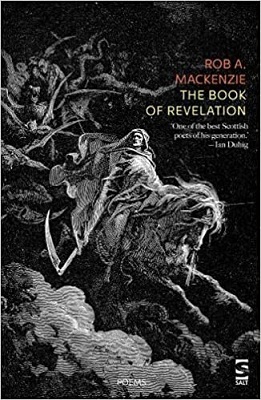
One slight caveat first: apart from the obvious influence on this collection of the last book of the Bible, according to the back cover it also owes a debt to a pop group called The Fall and its lead singer. This angle I can’t comment on, having no knowledge of them.
The Bible, however, is another matter; many will recall reading the highly figurative, visionary, freewheeling language of Revelation in a state of bemusement, wondering what exactly the author was on at the time. Mackenzie’s collection begins with a long sequence of poems, each with a quotation from Revelation as epigraph, and it quickly becomes apparent that this is a very modern take on the text which inspired it. The first poem, “Chapter 1”, with its epigraph “‘I am the Alpha and the Omega,’ says the Lord God, ‘who is, and who was, and who is to come, the Almighty.’ (v.8)” sets the ultra-contemporary idiom:
Nothing
matters if all of it matters more
or less equally to everybody.
No matter! Mark the epoch
of lips and tits. Which are
more popular with your
target group? Or mark
the apocalypse with
twats on Twitter,
you decide! The
people have
spoken. By
refer end
dumdum
dum di
dum
du
d
As we see, layout and typography are key players here and will be elsewhere. But even in the more conventionally laid-out poems, the tone, references, language are anything but conventionally lyrical. There is a pulsing anger and acidity throughout this sequence, and a relentless insistence on exactness, on debunking cliché and lazy formulae:
Our thoughts and prayers
are with them, even though we never actually pray
or think. (“Chapter 3”)
There is also, I think, a degree of despair. Later in the sequence, the epigraph “a third of the sun was struck, a third of the moon, and a third of the stars, so that a third of them turned dark. A third of the day was without light, and also a third of the night. (v.12)” leads to a recurring refrain of “thirds” which culminates in the end of “Chapter 13”:
One third
believed it; one third never believe anything;
one third seemed aware that they ought
at least to check for proof, and some did.
In Part Two, a guinea pig intermittently takes centre stage. I’m not sure this little chap should always be seen as purely metaphorical; in “The Experimental Guinea Pig” he sounds pretty real, but in other poems, notably “The Guinea Pig’s Search For God”, he does sound ruefully reminiscent of humanity:
Minor troubles: lumps, thinning fur, the Internet’s
fatal diagnosis; the guinea pig probes its bowl
for short-term solutions disguised as mark-down
parsley.
The technical adeptness continues from part 1: there are two centos, one made up of lines by people assassinated for political reasons (“Lines from Those Killed By The State”) and one of “Lines from the Drowned”. Two other things that continue are the contemporary idiom – I don’t know when I last read a collection that used, in particular, the argots of social media and commerce so effectively – and the underlying acerbity. For all its wit and wordplay, the tone of this collection is dark; its take on humanity often understandably jaundiced. In “The Future” (whose title I don’t think is a reference to the bleak Leonard Cohen song, but with a poet so aware of popular culture one can’t be sure), one can hear the frustration with shallowness, ignorance, complacency:
Doncha see the future
brightening like a golden sunset? The future is in capable
hands, between tweets. Headlines are a kind of poetry,
that’s what we think. Shut up, everyone says, you don’t
know anything, you just think things.
Look at that peerless line-ending, forcing one to read "incapable" in tandem with "in capable"... this is the sort of technical detail he uses so well, not for the sake of cleverness but to alter and deepen the reading experience.
This is a dense, allusive, layered collection and I feel I shall need several more readings to really get under its skin. That will be no hardship, and anyway I always feel it is a virtue in a book not to give up all its meaning at once.
September 10, 2020
Review of The Night Jar by Louise Peterkin, pub. Salt 2020

I open the Night Jar
The taut lid turning makes the noise of a rock
revolving on the ground.
I collect the materials of the small hours
- for the eponymous Night Jar is not a nightjar but a jar where the ingredients of night are kept. This agreeable surprise sets the tone for some lively what-ifs: a nun escaping to the circus, Jonah’s whale telling the story from its point of view. But there are also poems grounded very firmly in reality, like the deceptively titled “Siren Song”, in which a relationship that began romantically has dwindled into boredom. It’s surprisingly hard to convey boredom in a poem without actually being boring, and I don’t know that I have seen it done more skilfully than here:
Oh God make something happen. Anything
to break the drone of the morning,
the buzz-cut of flies, the neighbours mowing.
The television casts mutely an actress, gesticulating
like a lobster held aloft by a chef. You flip
through your supplement with a slow tenderness.
You’re mumbling something . . .
the merits of sustainable trout fishing.
The insistent -ing line-endings do a great job of conveying the woman’s boredom to the readers without actually inflicting it on them. This is a first collection, but it doesn’t feel like one; it is both more technically adept and more assured than most debuts.
It also has a sharp sense of humour. I don’t often laugh aloud at poems, but I did at “Perfume”, about some children’s cack-handed attempt to make perfume out of garden flowers as a gift for their mothers, who doubtless had to accept the resulting malodorous sludge with feigned delight. The success lies in knowing exactly where to stop; namely before we see the mothers’ reaction: the comic timing is exact.
Not all of her more outré images work for me; I’m not entirely convinced by “faint arcs of gore under each nail/ as if I had been playing a black pudding piano” (“Renfield”). And there are poems, like “For Ratatouille”, where I’m just not sure what her aim is - I presume I’m not actually meant to feel sorry for cooked peppers, and I can’t see what else the poem might be trying to do. I suspect it might be a result of the pernicious theory that “there must be a poem” in every trivial incident. Nor will every reader manage to catch every allusion – this is very allusive poetry, mining especially the fields of cinema and fairytale. But this shouldn’t matter when the poems work on their own, which they mostly manage by doing some re-imagining, as in the voice of the worker in “The Snow Queen’s Factory”:
Days went by in an opiate whirr of machinery.
Someone had tightened the vice of the night
so morning and home time
were the same slice of monochrome.
I found this a lively, ambitious first collection with, already, a voice of its own and plenty to say.
September 1, 2020
Review of Miriam, Daniel and Me by Euron Griffith, pub. Seren Books 2020
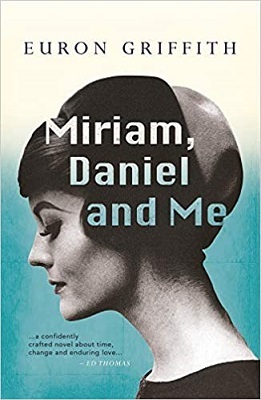
"The driver started the engine and the Ford Anglia pulled off. In the mirror, Miriam watched Pantglyn fall away like something suddenly cut loose. They were going to pick up the suitcases to go on their honeymoon. Daniel had booked a weekend in London.
On the Saturday he took her to Stamford Bridge to see Chelsea play Arsenal."
Griffith is not a new writer; he has published four novels in Welsh (one for children) and a short story collection in English, The Beatles in Tonypandy (Dean Street Press 2017). I still recall reading the title story of that collection, back in his student days, and wondering if I’d ever read a funnier or more inventive long short story. This, however, is his first novel in English, concerning three generations of a North Wales family.
Given his previous experience, it isn’t altogether surprising that his narrative techniques provide a lot of the interest, two of them in particular. The story is not linear; it switches back and forth between generations quite a lot and hence between points of view – the “me” of the title, Daniel and Miriam’s son, is a first-person narrator of what he himself sees, but other people’s experiences are told in close-third. The switches of time and viewpoint may at first seem arbitrary but are in fact carefully orchestrated; their effect is that we see events first and only later find out what lay behind them; we meet people but then get to know them better. For instance, we learn that Miriam’s friend Leah was proposed to in a rather odd and unexpected way; only much later do we find out why – rather as she may have done herself.
In addition, the chapters are very short. Few extend over more than three pages; many are shorter, one is half a page. They are vignettes, brief glimpses into people’s lives. The net effect of both this and the non-linear narration is to create the effect of autobiography, of a person finding out about his past via family anecdotes and disconnected memories and later filling the story out with information he finds elsewhere. I don’t know, incidentally, whether the story is in fact autobiographical, nor do I think it matters; the point is to create the effect of autobiography, which these techniques succeed well in doing. Only in chapter 51, where we are temporarily misdirected about the identity of someone who has died, did I feel the device was misdirection for its own sake.
The boy-narrator (unless I missed it, we never do learn his name) grows up in the sixties and the protests against the 1969 investiture of Charles as prince of Wales play a part in the narrative. The atmosphere and idiom of the period are well evoked; he has the details off pat, the right TV programmes, cars, wished-for toys, and this accuracy inclines me to believe he has the details of the earlier periods, which I can’t vouch for personally, right as well. It doesn’t sound like knowledge he had to “research”, either (which is of course how research in fiction ought to come across). The child-voice is convincing too.
One warning: if you are one of those readers, and I count myself among them, who would rather avoid any fictional depiction of cruelty to animals, you will want to skip chapters 29 and 49. This is easily done. They are self-contained, concern a minor character and avoiding them will not materially affect your reading of the novel. I don’t say they are completely irrelevant; they are probably there to establish gritty rural realism or whatever, but I wouldn’t say they were essential either.
Running alongside Miriam’s actual story is one that never happened, a direction her life might have taken but didn’t. This fades as her real life takes over but resurfaces at the end, in a conclusion which is the more moving for not being wistful or sentimental: things are as they are and it is pointless to idealise what might have been at the expense of what was.
By the way, if you can still get hold of his short story collection. The Beatles in Tonypandy, pub. Dean Street Press 2016, and there’s a kindle edition as well, do! That title story is still one of the most entertaining I’ve ever read.



